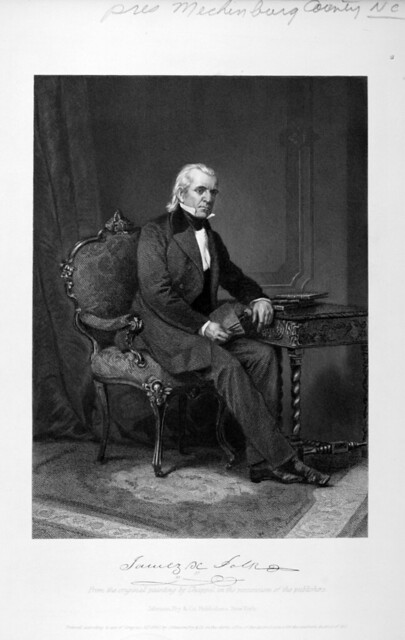Editor's Note – In the summer of 2012, Ansley Wegner, a historian with our Research Branch, wrote a series of blog posts highlighting various historical destinations around the state. This is the fifteenth post in that series. You can see all Wegner's posts on this page.
With a national political convention taking place in Charlotte next month, I invite visitors and North Carolinians, alike, to visit the President James K. Polk State Historic Site. Polk remains a political icon, and is one of the most highly regarded presidents among scholars and experts.
11th President Has Roots Near Charlotte
James Knox Polk, the 11th president of the United States, was born in North Carolina in 1795. While the original log home on the Polk’s farm in Mecklenburg County, just south of Charlotte, has disappeared, a cabin accurate to the period is open to the public at the Polk site.
Polk and his family moved to Tennessee in 1806 to reunite with other family members already there. He returned to his home state to attend the University of North Carolina, where he graduated with honors in 1818. Of his Chapel Hill days he later recalled,
 It was here that I received lessons of instructions to which I mainly attribute whatever of success or advancement has attended me in subsequent life.
It was here that I received lessons of instructions to which I mainly attribute whatever of success or advancement has attended me in subsequent life.
After graduation Polk returned to Tennessee to study law. His first election was to the state legislature in 1823. He then became a member of the U.S. House of Representatives and served for 14 years, including 4 as speaker. In 1837, he was elected Governor of Tennessee for one term.
One Term, True to His Word
A staunch Democrat, Polk narrowly won election to the Presidency over Henry Clay in 1844, making him the youngest president to that date at age 49. Polk entered the presidency with a clear plan of action; foremost was westward expansion. Seen by contemporaries as conscientious and attentive to the needs of the country, in his Presidential campaign, he promised not to run for a second term.
True to his word, he did not.
